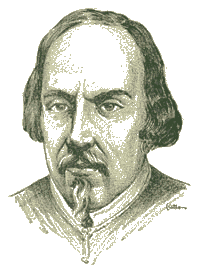 PEDRO CALDERON de la BARCA, generally refered to simply as Calderon, ranks next to Lope de Vega in the list of Spanish dramatists. He came of a substantial old family and his father held a government position. His education was secured at the Jesuit College in Madrid, and later he studied law, though there is no record of his having practiced before the courts. As early as his thirteenth year he felt the urge to write plays and created the first of the long list which he was destined to leave for future generations. What this play was and whether or not it was published, the records do not say.
PEDRO CALDERON de la BARCA, generally refered to simply as Calderon, ranks next to Lope de Vega in the list of Spanish dramatists. He came of a substantial old family and his father held a government position. His education was secured at the Jesuit College in Madrid, and later he studied law, though there is no record of his having practiced before the courts. As early as his thirteenth year he felt the urge to write plays and created the first of the long list which he was destined to leave for future generations. What this play was and whether or not it was published, the records do not say.
Calderon was still very young when he was commissioned by Philip IV to write a series of plays for the royal theater in the Buen Retiro. In 1637, possibly in recognition of this service, the King made him a Knight of the Order of Santiago. Later his play-writing career was interrupted by military duty. He took part in the campaign against the Catalan uprising and rendered conspicuous and gallant service. After his retirement from the army on account of ill health he was granted a military pension.
Calderon's early plays had been of a secular nature. After the death of his mistress in 1648, however, his thoughts turned toward religion and he took orders, later entering the priesthood just as de Vega had done. Quite naturally his later dramas are deeply religious in theme and treatment. In fact, many commentators think that Calderon was at his best as a writer of "autos," those religious plays that so closely resemble the English Mystery plays of the Middle Ages. About 80 of these "autos" survive in addition to 120 of the regular dramas.
With Calderon the Golden Age of Spanish drama came to a close. His thought was not universal like that of Shakespeare and Molière. Instead it was intensely local. His characters are less individuals in their own right than they are personifications of certain primitive passions. His plot motives are practically limited to three: loyalty to the King, devotion to the church, and the protection or assertion of one's honor through revenge.
Calderon wrote write up to the time of his death, apparently without any diminution of his powers or his interest. Nor did the fact that much of his life was spent in poor health seem to affect the quality or quantity of his output. Probably the best known of his dramatic works, so far as present day readers are concerned, is the secular play, Life is a Dream.
Purchase Plays by Calderon